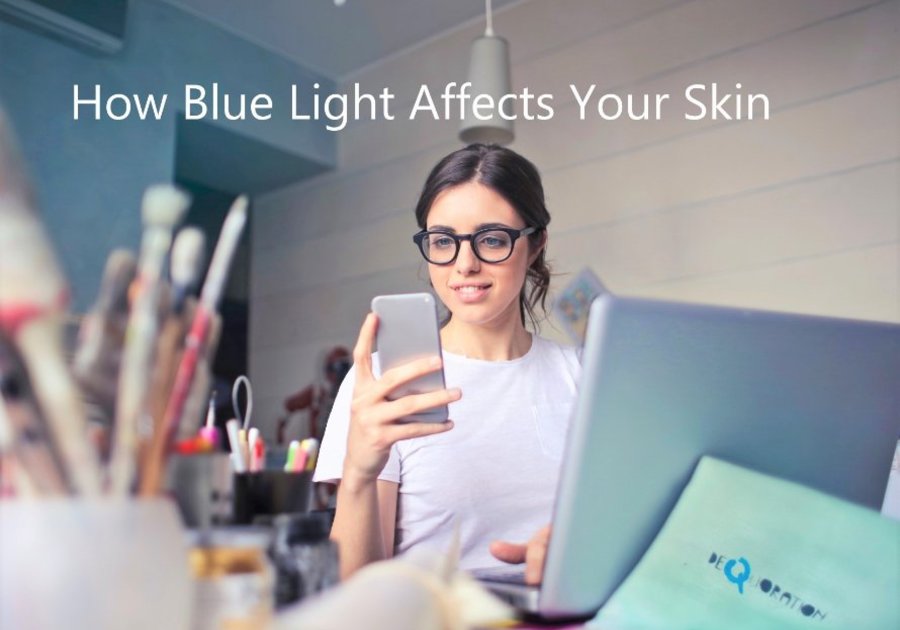Most people already know how blue light might damage their eyes, as many who work long hours at computers have invested in blue light-blocking glasses, which may mitigate some of the effects of blue light. This is a very inexpensive investment to protect yourself and your kids.
As screen time continues to rise, experts are now concerned about the effects of blue light on our skin and whether our screens can damage our entire face and not just our eyes. This isn't something our older generations had to worry about, but Generations X, Y (millennials) and Z have all spent years in front of screens -- Gen X as their careers became more digitally driven, millennials as computers became more prevalent in schools and universities and Gen Z as tablets and smartphones became strongholds in childhood entertainment.
Now, a few decades into the technological revolution (will it ever end?), science shows us that the light from our favorite devices might be harsher than we ever imagined.
Exactly What Is Blue Light?
Blue light (not to be confused with UVA or UVB rays) is emitted from our computer screens, cellphones, and other digital devices. Blue light is the highest energy light in the visible spectrum. It's high energy gives blue light the ability to penetrate more deeply into the dermis than wavelengths with lower energy. Blue light, also called HEV light for "high-energy visible" light is mostly known for its emittance from screens, such as on laptops, phones and TVs.
If you want me to be a little technical, it's generally defined as visible light from 380 to 500 nanometers. Other types of visible light fall below that on the electromagnetic spectrum, and UV light, which is invisible radiation, falls above blue light with wavelengths of 100 to 380 nanometers.
Does Blue Light Damage Skin?
The research on blue light and skin damage is a relatively new area of study.
Emerging studies show that blue light can cause generation of reactive oxygen species. A reactive oxygen species is an unstable molecule that contains oxygen and reacts with other molecules, according to the National Cancer Institute. These unstable molecules damage skin cells, which results in faster aging due to the breakdown of collagen and elastin.
There are also studies suggesting that blue light can cause sustained pigment changes.
It is important to understand that studies are emerging, and we are still learning the extent of how blue light affects the skin. What we do know is there is evidence of obvious detrimental changes with exposure to blue light, and it is worth protecting our skin from blue light.
Blue light can potentially damage the skin in a number of ways:
● Induces oxidative stress, which can lead to inflammation and collagen degeneration
● Disrupts activity of melanocytes, which leads to uneven and excessive pigmentation
● Contributes to photoaging, or skin aging induced by light waves (the same thing that happens when you spend time in the sun)
● Weakens the outermost layer of your skin and delays its recovery from daily skin stressors
How To Protect Your Skin From Blue Light
The obvious answer is to spend less time in front of screens. However, that's not an option for many people, particularly those who have computer-based jobs.
Other tips include:
● Wear blue-light blocking glasses to at least protect your eyes and the delicate skin surrounding your eyes
● Keep night mode enabled on all of your devices at all times to reduce blue light emittance in favor of gentler yellow or orange light. You could also purchase a blue light shield for your devices
● Wear SPF daily. Sunscreen is your best protector against photo-aging and skin damage because the sun is the most significant source of light and radiation. Chemical sunscreen ingredients aren't known to block HEV light, but the physical blockers -- titanium dioxide and zinc oxide -- might. Tinted sunscreens may offer an extra element of protection because they often contain iron oxides, which increase the spectrum of light blocked.
Anti-blue-light Skincare
There are products hitting the market full of ingredients proposed to protect and eventually undo any damage caused by blue light. My favorite is the Digital Age Defense Serum. It’s a lightweight, new generation serum that features the latest technology in skincare to help protect against visible signs of aging from blue light. It energizes fatigued skin, is hydrating and refreshing.
Key Benefits:
➢ Helps prevent visible signs of aging related to blue light
➢ Visibly energizes fatigued skin
➢ Aids in hydration
➢ Cools and refreshes
➢ Helps reduce the appearance of redness and blotchiness
➢ Light and fast-absorbing formula
➢ No added fragrance
➢ Formulated without gluten, parabens, or animal by-products
➢ Non-comedogenic

Sara was born and raised in the Czech Republic. In 2012, she moved to the US and worked many jobs but never felt fulfilled, which lead her to share her story and her passion for fitness (former fitness professional), nutrition tips (vegan) and makeup. She is also a new mom. Sara and her husband welcomed their baby boy in June 2020.
Sara is a makeup junkie at heart and decided to start her own business to help women look and feel their best. She loves supporting other business moms feel beautiful inside and out as they work to create their own destinies. You could find out more about her HERE.



